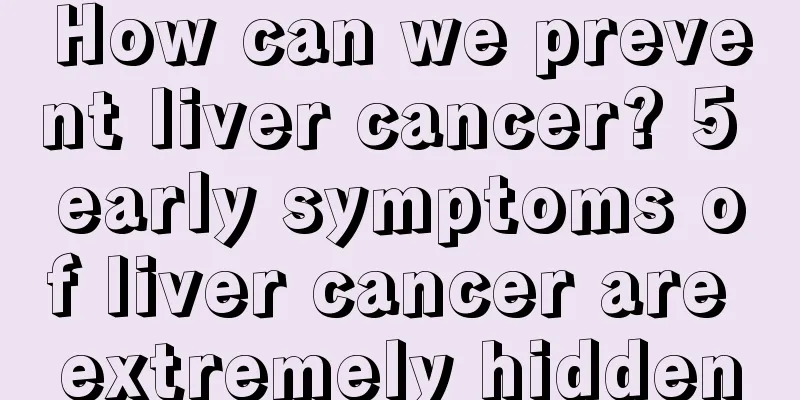My stomach feels uncomfortable after eating

|
The symptom of feeling uncomfortable in the stomach after eating is most likely caused by indigestion, which is consistent with its characteristics. However, in order to make a better judgment, we need to have a comprehensive understanding of indigestion, especially the symptoms of indigestion, and then combine other characteristics of our own to make a comprehensive judgment, so as to determine whether it is due to indigestion. Dyspepsia is a clinical syndrome caused by gastric motility disorders, which also includes gastroparesis and esophageal reflux disease. Indigestion is mainly divided into functional dyspepsia and organic dyspepsia. Functional dyspepsia belongs to the categories of "abdominal distension", "stomach pain" and "noise" in traditional Chinese medicine. The disease is in the stomach and involves organs such as the liver and spleen. It should be treated based on syndrome differentiation and methods such as strengthening the spleen and stomach, soothing the liver and regulating qi, and digesting food and relieving stagnation. Clinical symptoms and diagnosis 1. Upper abdominal pain Upper abdominal pain is a common symptom. Some patients have upper abdominal pain as the main symptom, with or without other upper abdominal symptoms. Upper abdominal pain is often irregular. In some patients, upper abdominal pain is related to eating, manifesting as fullness pain that is relieved after eating, or as persistent abdominal pain between 0.5-3.0 hours after a meal. 2. Early satiety, bloating, and belching Early satiety, abdominal distension, and belching are also common symptoms, which may occur alone or in a group, with or without abdominal pain. Early satiety refers to a feeling of fullness shortly after eating, resulting in a significant reduction in food intake. Upper abdominal distension often occurs after meals, or persists and worsens after meals. Early fullness and epigastric distension are frequent with belching. 3. Symptoms of functional dyspepsia Many patients also have mental symptoms such as insomnia, anxiety, depression, headache, and inattention. These symptoms are related to cancer fear in some patients. Functional dyspepsia: Those who have the above-mentioned indigestion symptoms but have no definite organic disease to explain are called functional dyspepsia (FD). This type of indigestion has the highest incidence and most people have experienced it. The main causes of the disease are related to mental and psychological factors, such as mood swings, sleep status, poor rest, stimulation from tobacco and alcohol, etc. Statistics from Western countries show that FD accounts for approximately 20% to 40% of digestive system diseases. FD can be divided into 3 subtypes based on symptoms: (1) Ulcer-like dyspepsia type, which is characterized by symptoms of peptic ulcer without the presence of ulcer. Recent studies have found that patients who are often faced with stress may have a stress reaction, with intermittent increase in gastric acid excretion. In addition, motility disorders prolong and increase the damage of gastric acid to the mucosa. Therefore, patients with this type may improve by eating or taking H-receptor antagonists. (2) Dysmotility-like dyspepsia type, which is characterized by clinical manifestations of gastric retention symptoms. Patients have difficult-to-localize upper abdominal pain or discomfort, which is often caused by eating or aggravated after meals. At the same time, they also have upper abdominal distension after meals, early satiety, nausea or vomiting, and poor appetite. (3) Specific dyspepsia type: patients with FD symptoms but not meeting the above two groups of characteristic dyspepsia. Organic dyspepsia: After examination, it can be clearly determined that the indigestion symptoms are caused by a certain organ disease, such as liver disease, bile duct disease, pancreatic disease, diabetes, etc. For these patients, treatment is mainly targeted at the cause, with auxiliary supplementation of digestive enzymes or improvement of gastric motility to relieve indigestion symptoms. (4) Organic dyspepsia: After examination, it can be clearly determined that the dyspepsia symptoms are caused by a disease in a certain organ, such as liver disease, bile duct disease, pancreatic disease, diabetes, etc. For these patients, treatment is mainly targeted at the cause, with auxiliary supplementation of digestive enzymes or improvement of gastric motility to relieve indigestion symptoms. Therefore, after the symptoms of indigestion occur, you should check promptly, and first confirm whether there are other diseases associated with it. |
<<: What are the symptoms of high intraocular pressure
>>: I feel my stomach pressing against me when I sit
Recommend
How to diagnose bone cancer?
Although bone cancer is not a common cancer, its ...
What can't you eat if you have diarrhea
The weather is hot and cold, and it is inevitable...
Is Chinese medicine useful for liver cancer
In the Chinese tradition, there is a deep affecti...
Can thyroid cancer be cured?
Many patients do not want to seek treatment when ...
What should I do if my teeth have been yellow since childhood
The feeling of showing white teeth when opening y...
Will brain cancer cause facial swelling and pain?
It is recommended that patients go to a regular t...
What calcium tablets are good for adults
We all know that many children are supplemented w...
How much does it cost to treat early stage brain cancer
Clinically, brain tumors can be treated surgicall...
What are the symptoms of late-stage nasopharyngeal carcinoma and how to take good care of it
What are the symptoms of late-stage nasopharyngea...
Can teratoma be treated?
Many teratoma patients are very nervous after bei...
Tips for removing freckles, how to remove freckles with lemon
We may not be very familiar with lemon freckle re...
How to remove acne particles at the corners of the eyes
The symptom of pimples at the corners of the eyes...
What are the specific symptoms of ovarian cancer
Ovarian cancer is one of the common tumors of the...
How to refresh yourself when you feel sleepy
Some people need to work overtime until late at n...
What supplements should lung cancer patients take?
Lung cancer is a common malignant tumor of the re...









